Consuming 5 grams of protein per pound of body weight is excessive and can lead to serious health issues. You'll likely experience digestive discomfort, including bloating, constipation, and nausea. Your kidneys will be strained, potentially causing increased urination, thirst, and fatigue. This high intake can disrupt your metabolism, leading to inefficient protein processing and possible weight gain. You may also face nutrient imbalances, as excessive protein can crowd out other essential macronutrients. Additionally, you'll retain more water, causing temporary weight increase. It's essential to consult a healthcare professional before drastically increasing your protein intake. Understanding the proper balance of nutrients is key to maintaining peak health.
Core Insight
- Excessive water retention may occur, leading to increased weight on the scale.
- Digestive system can become overloaded, potentially causing bloating and constipation.
- Kidneys may experience strain due to increased workload and risk of dehydration.
- Nutrient imbalances can arise from inadequate intake of carbohydrates, fats, and fiber.
- Professional guidance is crucial to prevent health issues and maintain proper dietary balance.
Protein Intake Recommendations
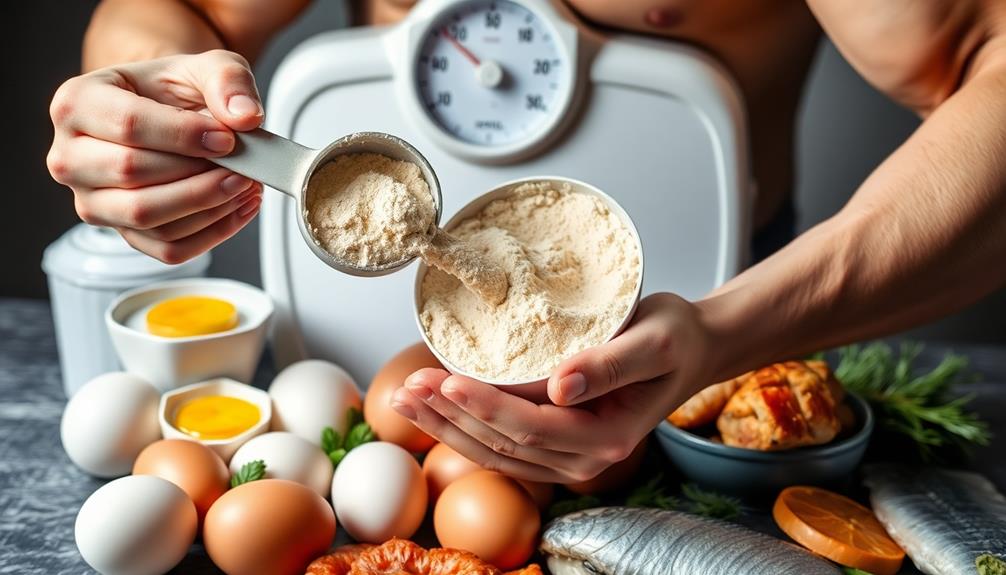
The amount of protein you need depends on your body and goals. The official recommendation for adults is 0.8 grams per kilogram of body weight. But this is just the minimum to avoid health problems. It might not be ideal if you want to build muscle or stay fit. Protein-rich oatmeals can be a great breakfast with up to 20 grams of protein in one serving.
Athletes and active people often need more protein. Experts say they should get 1.2 to 2.0 grams per kilogram of body weight. This is much lower than the 5 grams per pound mentioned in the article title.
Be careful not to eat too much protein. It could strain your kidneys and liver. It's best to talk to a nutritionist or dietitian. They can give you specific advice based on your needs and goals.
Digestive System Overload

Eating way too much protein can overload your digestive system. Your body will have a hard time processing all that protein, which can make you feel uncomfortable and cause health problems.
Here's what could happen to your digestive system:
| Organ | Effect | Symptom |
|---|---|---|
| Stomach | Too much acid | Heartburn |
| Intestines | Gut bacteria problems | Bloating |
| Kidneys | More work than usual | Dehydration |
You might feel sick to your stomach, get constipated, or have diarrhea as your body tries to handle all the extra protein. Your kidneys will be working extra hard to filter out the excess nitrogen, which could strain them. You may also feel tired because your body is using a lot of energy for digestion.
Kidney Strain and Function
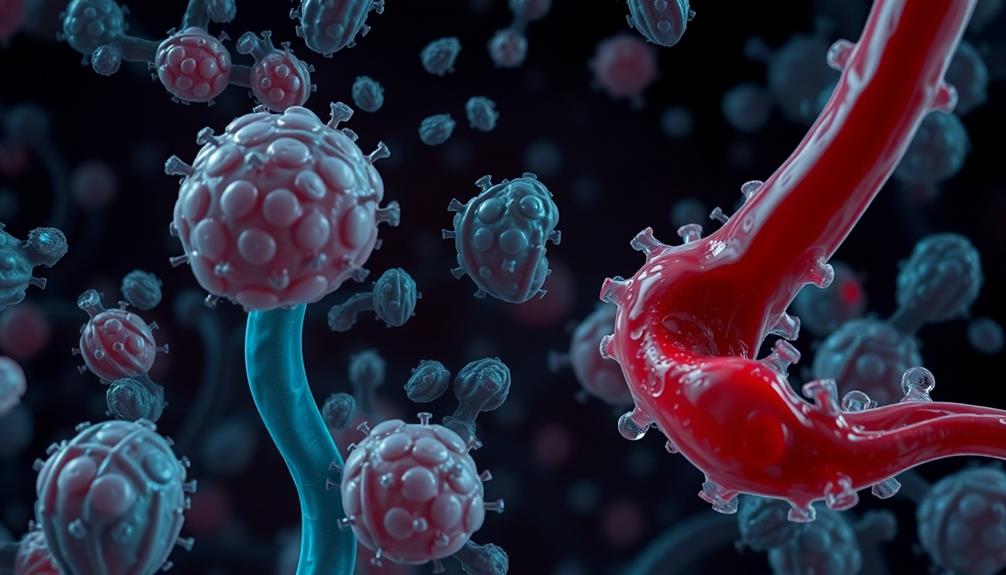
Eating too much protein can strain your kidneys. The kidneys filter waste from protein breakdown, and consuming 5 grams per pound of body weight is excessive. This stress may harm the kidneys, especially if you already have kidney problems. While glutamine supplements can help muscle recovery, overdoing any protein isn't good for the kidneys. Balance is important for overall health.
Possible effects on the kidneys:
- More urea production
- Higher blood pressure
- Risk of dehydration
- Calcium loss through urine
When the kidneys work too hard to handle extra protein, you might pee more, feel thirsty, and get tired. Aim for a balanced protein intake that meets your needs without straining the kidneys. Protein is important, but don't overdo it. Moderation is key for kidney health and general well-being.
Metabolic Impact and Inefficiency
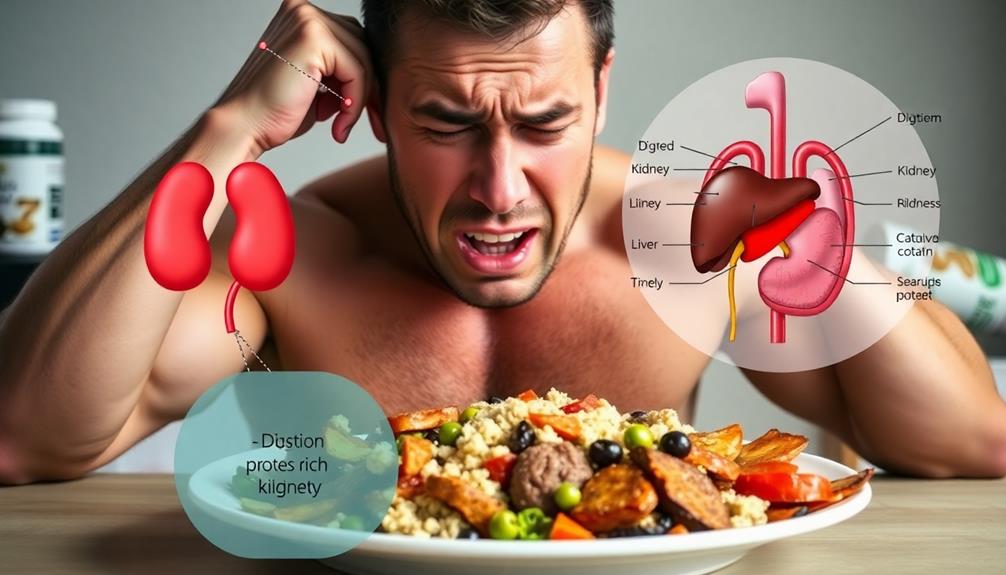
Eating too much protein can mess with your metabolism. Your body has a hard time processing large amounts of protein, leading to inefficiency. This means your system works overtime to break down and get rid of the extra amino acids. The ideal amount of protein per serving is usually 20-30g, which is enough for muscle growth and recovery. Eating much more than this can lead to diminishing returns and potential health problems.
Your body can only use a certain amount of protein for muscle growth and repair. The leftover protein gets turned into glucose or fat, which isn't the best use of resources. This conversion process requires more energy, potentially increasing your calorie burn but not in a good way.
High protein intake can also throw off your body's normal metabolic balance. It may lead to increased insulin resistance and affect hormone production. You'll likely experience ups and downs in energy levels and possible digestive problems. Over time, this metabolic stress can impact your overall health and well-being.
Nutrient Imbalance Concerns

Eating too much protein can cause nutrient imbalances. When you eat 5 grams of protein per pound of body weight, you might not get enough of other important nutrients. This can cause problems like:
- Not eating enough carbs, which can make you feel tired
- Not getting enough fat, which is important for your hormones and cells
- Not getting enough fiber, which helps your digestion and gut health
- Missing out on vitamins and minerals from other foods
By focusing too much on protein, you might not get all the nutrients your body needs. This can lead to health issues. It's important to eat a balanced diet with all the macronutrients and different types of foods. This will help you get all the nutrients your body needs to stay healthy.
Protein powders like Orgain Organic Vegan can be helpful, but eating too much can throw off your nutrition. The key is to have a balanced approach to eating protein. This will help you stay healthy and keep your body working well.
Dehydration Risks

Thirst is common with high-protein diets because your body needs more water to process the extra protein. If you don't drink enough water, you could get dehydrated. Electrolyte gummies can help replace minerals lost when you pee more often.
Your kidneys work hard to filter out excess nitrogen from breaking down protein. This means you'll pee more, which can make you dehydrated. If you don't drink more water, you might feel tired, get headaches, or not do as well in sports.
To avoid dehydration, drink at least 8-10 glasses of water every day when eating a lot of protein. Check your pee color too. If it's pale yellow, you're hydrated. If it's dark yellow, drink more water.
Bone Health Implications
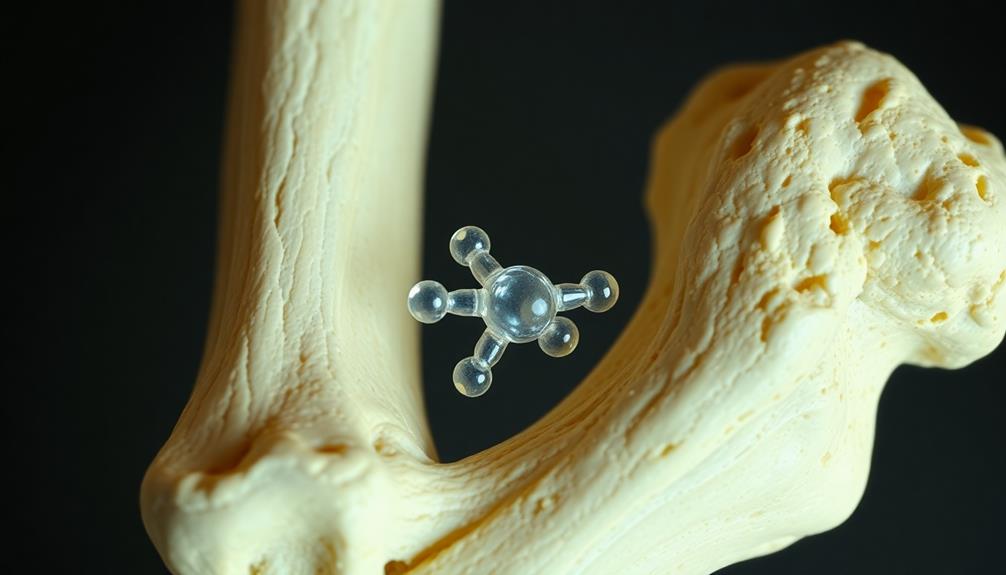
Staying hydrated is crucial, but it's also important to think about how a high-protein diet affects your bones. Eating too much protein can impact your bone health in a few ways. Post-workout vitamins may help reduce some of these effects, especially when it comes to bone health and recovery.
- More calcium leaving your body
- Possible acid buildup in your body
- Changes in hormone levels
- Differences in how fast your bones break down and rebuild
These things can lead to weaker bones over time. But it's not all bad news. You need enough protein to keep your bones strong. Some studies even suggest that eating more protein might be good for your bones if you also get enough calcium. The key is finding the right balance. Make sure you're getting enough calcium and vitamin D along with your protein. If you're thinking about a high-protein diet, talk to a healthcare professional first to figure out what's best for you.
Cardiovascular Effects
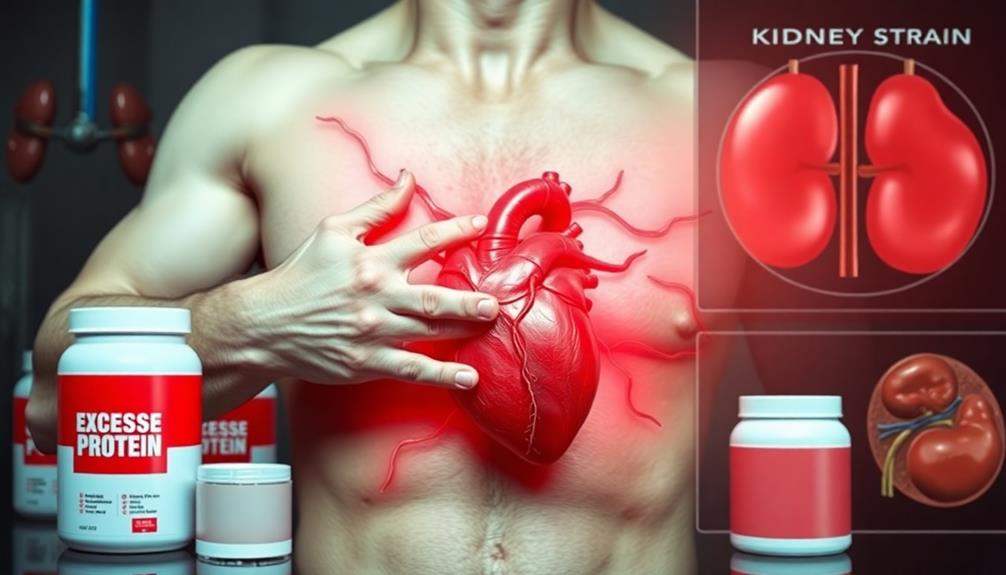
Eating way too much protein can hurt your heart and blood vessels. When you eat 5 grams of protein for every pound you weigh, it puts a lot of stress on your body. Your kidneys have to work really hard to handle all that extra protein. This can make your blood pressure go up. It might also change your cholesterol levels in a bad way, which could increase your chances of getting heart disease. Even though eating carbs right after a workout can help you recover, eating too much protein is not good for your heart.
High-protein diets often come with a lot of saturated fat. This fat can build up in your arteries and make them narrower. When that happens, it's harder for blood to flow through them. It raises your risk of having a heart attack or stroke. Protein is important for your body, but eating way too much of it can be really bad for your heart and blood vessels.
Weight Management Challenges

Eating 5 grams of protein for every pound you weigh can make it hard to keep a healthy weight. That much protein adds a lot of calories to your diet. You might gain weight even if you don't mean to.
Protein has calories, just like carbs and fat do. Eating too much of it means you're probably eating more calories than your body needs. High protein diets can also make you cut back on other important foods, so you might not get all the nutrients you need.
Plus, your body holds on to more water when you eat a ton of protein. This makes the number on your scale go up. Protein is also hard on your digestive system. You could end up bloated and constipated.
Before you start eating this much protein, it's a good idea to talk to a doctor or dietitian. They can help you figure out how to get the right balance of protein, carbs, and fat in your diet. That way, you can stay healthy and keep your weight where you want it.
Frequently Asked Questions
Can Excessive Protein Intake Lead to Bad Breath?
Yes, excessive protein intake can cause bad breath. When you consume too much protein, your body breaks it down into ammonia, which can be released through your breath. This can result in an unpleasant odor.
Does High Protein Consumption Affect Muscle Recovery Time After Workouts?
Yes, high protein consumption can positively affect your muscle recovery time after workouts. It'll help repair and rebuild muscle tissue faster, reducing soreness and allowing you to bounce back quicker for your next training session.
How Does Overconsumption of Protein Impact Skin Health and Appearance?
If you're consuming too much protein, it can negatively impact your skin. You'll likely experience acne breakouts, excess oil production, and premature aging. Your skin may also become dry and dehydrated, leading to a dull complexion.
Are There Any Mental Health Effects Associated With Extremely High Protein Intake?
You may experience mental fatigue and mood swings with extremely high protein intake. It can affect your brain's serotonin levels, potentially leading to anxiety or depression. You'll also feel irritable and have difficulty concentrating due to nutrient imbalances.
Can Consuming Too Much Protein Interfere With the Absorption of Medications?
Yes, consuming excessive protein can potentially interfere with medication absorption. You'll want to be cautious, as high protein intake may affect how your body processes certain drugs. It's best to consult your doctor about your specific medications and diet.

